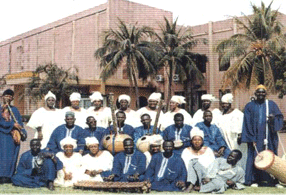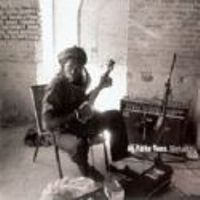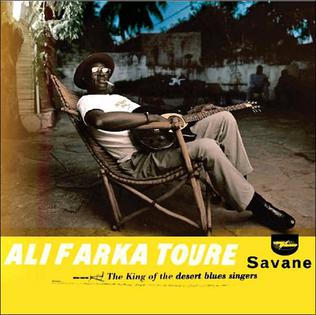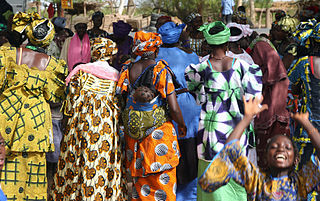
The music of Mali is, like that of most West African nations, ethnically diverse, but one influence predominates: that of the ancient Mali Empire of the Mandinka. Mande people make up around 50% of Mali's population; other ethnic groups include the Fula (17%), Gur-speakers 12%, Songhai people (6%), Tuareg and Moors (10%).

The Songhai people are an ethnolinguistic group in West Africa who speak the various Songhai languages. Their history and lingua franca is linked to the Songhai Empire which dominated the western Sahel in the 15th and 16th century. Predominantly adherents of Islam, the Songhai are primarily located in Niger and Mali. Historically, the term "Songhai" did not denote an ethnic or linguistic identity but referred to the ruling caste of the Songhay Empire known as the Songhaiborai. However, the correct term used to refer to this group of people collectively by the natives is "Ayneha". Although some speakers in Mali have also adopted the name Songhay as an ethnic designation, other Songhay-speaking groups identify themselves by other ethnic terms such as Zarma or Isawaghen. The dialect of Koyraboro Senni spoken in Gao is unintelligible to speakers of the Zarma dialect of Niger, according to at least one report. The Songhay languages are commonly taken to be Nilo-Saharan but this classification remains controversial: Dimmendaal (2008) believes that for now it is best considered an independent language family.

Mali Music is a 2002 album by musician Damon Albarn in collaboration with Malian musicians Afel Bocoum, Toumani Diabaté & Friends, and also featuring a cameo from Ko Kan Ko Sata.

The Festival au désert was an annual concert in Mali, showcasing traditional Tuareg music as well as music from around the world between 2001 and 2012. It was founded and directed by Manny Ansar, and attracted thousands of visitors, bringing a huge boost to the economy.

Habib Koité is a Senegalian-born Malian musician, singer, songwriter and griot based in Mali. His band, Bamada, was a supergroup of West African musicians, which included Kélétigui Diabaté on balafon.
Touré is the French transcription of a West African surname. The name is probably derived from tùùré, the word for 'elephant' in Soninké, the language of the Ghana Empire. The clan existed as kings of Zaghari on the middle Niger before the Moroccan invasion of Ghana. A theory of their origin holds that the Touré are descended from the "Roum," pre-Arab North African soldiers, and local women.

Niafunké is an album by Ali Farka Touré, released in 1999. The title reflects the name of the village in Mali where it was recorded. It is largely a traditional album concerning Mali.

Boureima "Vieux" Farka Touré is a Malian singer, composer and guitarist. He is the son of Malian musician Ali Farka Touré.
Moussa Kouyate is a kora player from Bamako, Mali. His father, Batourou Sekou Kouyate, was also a prominent kora player.

In the Heart of the Moon is a 2005 record by Malian musicians Ali Farka Touré on the guitar and providing vocals and Toumani Diabaté on the kora. The album was recorded in the "Toit de Bamako" conference room on the top floor of the Hotel Mandé overlooking the Niger River in Bamako, Mali. It is the first in a three-part series released on World Circuit Records entitled "The Hotel Mandé Sessions" followed by Savane and Boulevard de l'Independence. The album's title is derived from Touré's own more lengthy descriptive title for the recording session; "A very important meeting in the realm at the heart of the moon."
Tartit are a band from the Tombouctou Region of Mali. The group consists of five women and four men, all of whom are Tamasheq-speaking Tuareg. They formed in 1992 in a refugee camp in Mauritania. Imharhan, an expanded group that includes current and former Tartit members, incorporates electric instruments and cross-cultural experiments into their music.

Savane is the final solo album by Malian musician Ali Farka Touré. It is the third and final part of the Hôtel Mandé Sessions, featuring Touré and Toumani Diabaté, recorded by World Circuit head Nick Gold. The album was released posthumously by World Circuit on 17 July 2006, more than four months after Touré's death.

The Source is an album by Ali Farka Touré.

The culture of Mali derives from the shared experience, as a colonial and post-colonial polity, and the interaction of the numerous cultures which make up the Malian people. What is today the nation of Mali was united first in the medieval period as the Mali Empire. While the current state does not include areas in the southwest, and is expanded far to the east and northeast, the dominant roles of the Mandé people is shared by the modern Mali, and the empire from which its name originates from.
Niafunké is a small town on the Niger River in central Mali. The town is the administrative center (chef-lieu) of the commune of Soboundou in the Niafunké Cercle of the Tombouctou Region.

Ali Ibrahim "Ali Farka" Touré was a Malian singer and multi-instrumentalist, and one of the African continent's most internationally renowned musicians. His music blends traditional Malian music and its derivative, African American blues and is considered a pioneer of African desert blues. Touré was ranked number 76 on Rolling Stone's list of "The 100 Greatest Guitarists of All Time" and number 37 on Spin magazine's "100 Greatest Guitarists of All Time".
The Touré-Raichel Collective was a musical group led by Malian singer and guitarist Vieux Farka Touré and Israeli singer and pianist Idan Raichel. The group's debut album, The Tel Aviv Session, was released on Cumbancha in March 2012.
Nick Gold is a British record producer, multi-instrumentalist and music executive. He is the former CEO of World Circuit Records and the organiser of Buena Vista Social Club, a Cuban musical ensemble which he established in 1996. Gold is a two time Grammy Award winner. In 2006, The New York Times described him as a "Musical Matchmaker".











